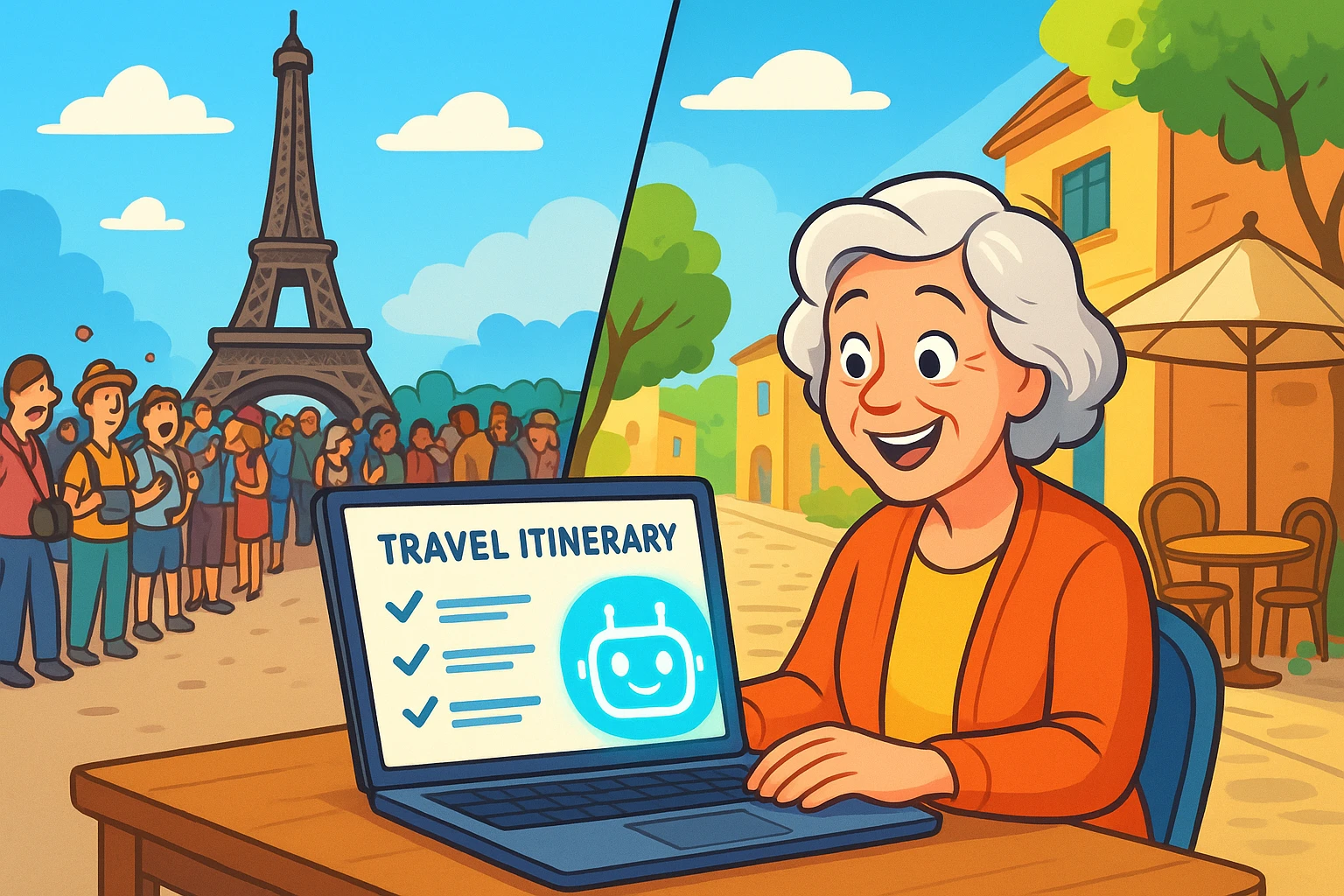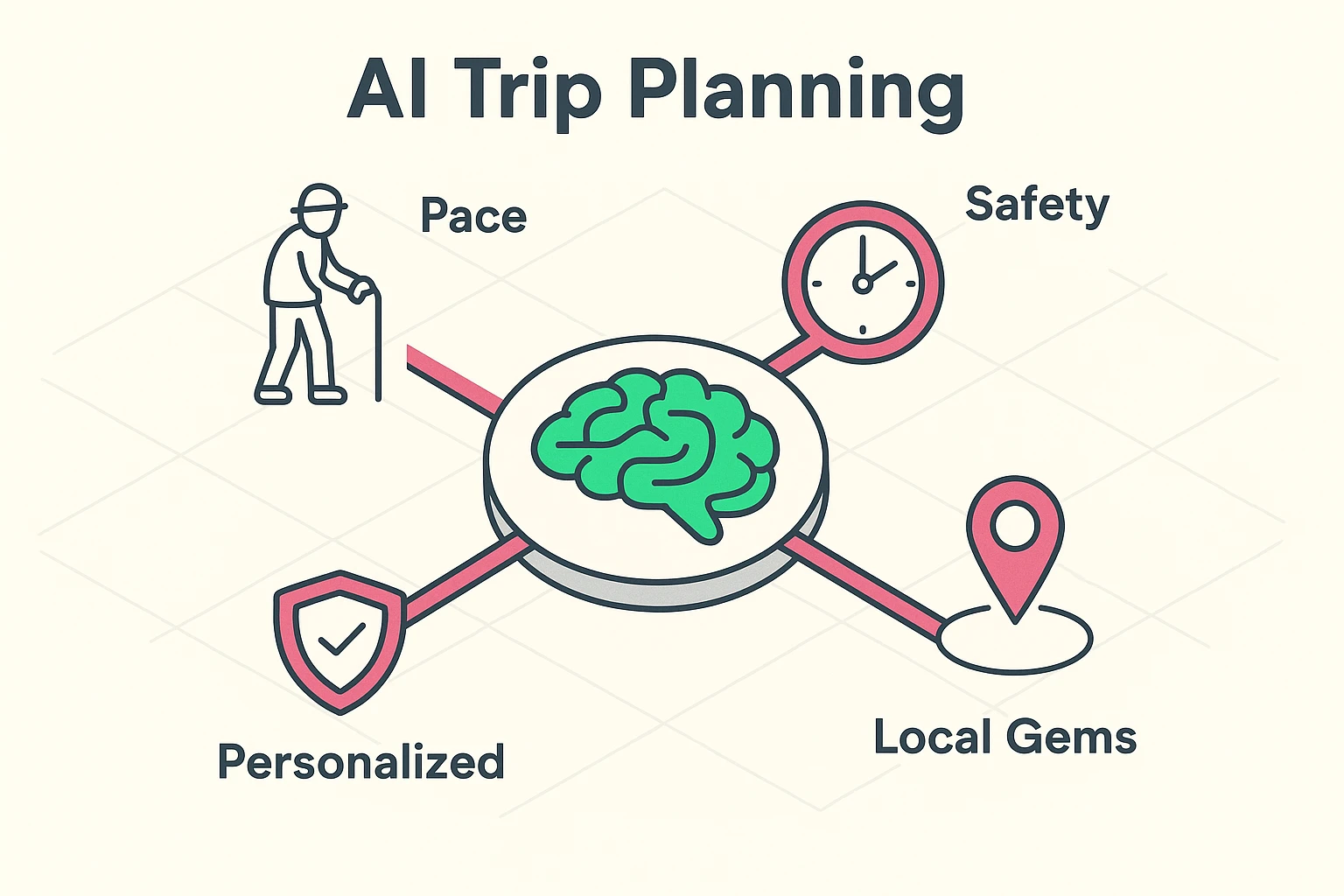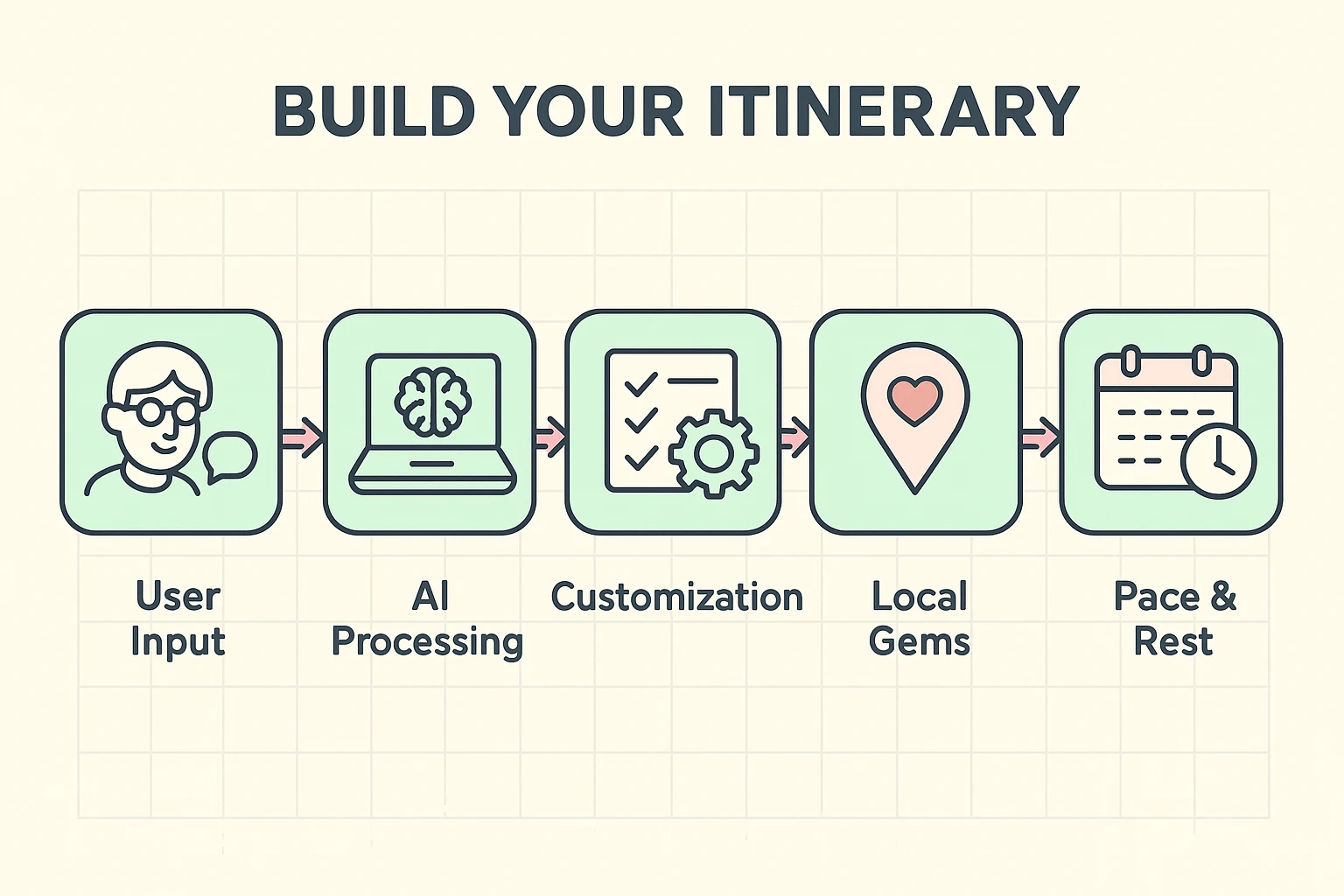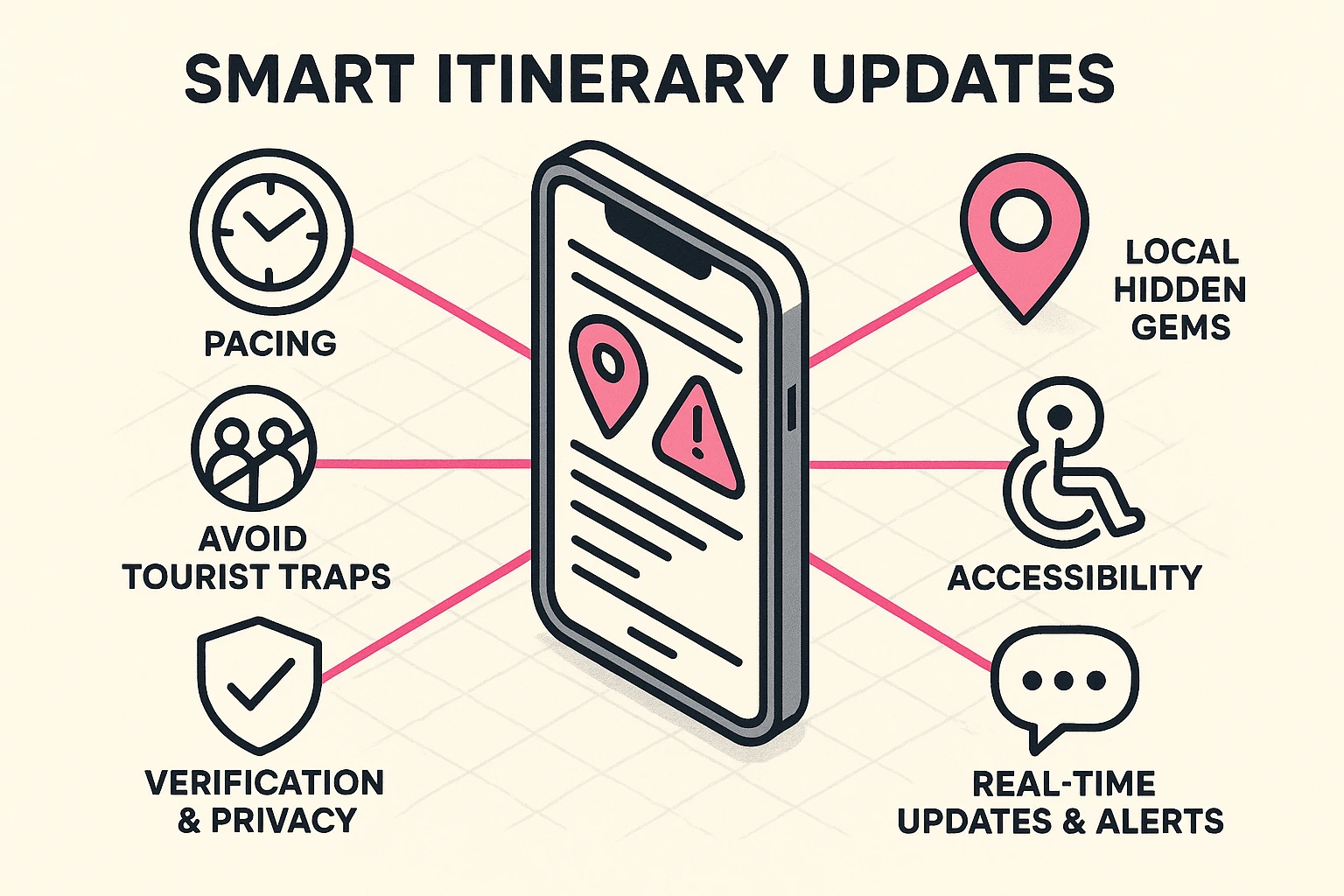
Newsletter Subscribe
Enter your email address below and subscribe to our newsletter

Remember planning a vacation in the old days? It was an Olympic sport. You’d spread a paper map the size of a small car across the dining room table, trying to decipher roads that looked like squiggly spaghetti. You’d have a stack of guidebooks, all recommending the exact same five “must-see” attractions, guaranteeing you’d spend half your trip waiting in line behind ten thousand other people wearing fanny packs.
The goal was a relaxing getaway. The reality was often a logistical puzzle that required the strategic mind of a four-star general and the patience of a saint waiting for a dial-up modemA modem, short for modulator-demodulator, is a device that enables computers and other digital devic... More to connect.
If you’ve ever found yourself on a “charming cobblestone street” that was actually a treacherous ankle-twisting obstacle course, or at a famous monument so crowded you could only see the back of someone’s head, you know the struggle. What if you could plan a trip designed just for you—your pace, your interests, and your definition of a good time?
Well, grab your coffee, because that’s exactly what we’re going to talk about. The same technology you hear about in the news, Artificial IntelligenceArtificial Intelligence (AI) is basically when computers get smart—really smart. Imagine if your c... More (AI), is now your secret weapon for crafting the perfect senior-friendly vacation, minus the crowds and the hassle.

Before your eyes glaze over, let’s be clear: this isn’t about learning to code or building a robot. Think of an AI trip planner as the world’s most knowledgeable and obedient travel agent, who happens to live in your computer.
You don’t need to know how the engine works to drive a car, and you don’t need to understand complex algorithms to use AI. You just need to know how to talk to it.
These AI tools are designed to have a conversation with you. You tell them what you want in plain English, and they do the heavy lifting. They’ve read millions of web pages, travel reviews, and train schedules. They can create a personalized itinerary that a human travel agent would need weeks to assemble.
The real magic for seniors is in the details. You can tell it things like:
The AI doesn’t just hear you; it understands and builds a plan around your specific needs, turning a generic vacation into your vacation. It’s one of the many ways you can Unleash Your Inner Artist: Creative Hobbies Powered By AI for Seniors, applying that same creative spark to your travel plans.
Ready to give it a whirl? It’s easier than programming a VCR (and way more rewarding). Here’s how you can create your first custom itinerary.
Step 1: Choose Your ToolThere are many AI platforms out there, like iPlan.ai, Layla.ai, or even the AI assistants built into search engines. Many are free to start. The key is to find one with a simple, clean interface that feels easy to use.
Step 2: Start the Conversation (Give It Your “Prompt”)This is the most important part. A “prompt” is just the instruction you give the AI. The more detailed you are, the better your results will be. Don’t just say, “Plan a trip to Paris.”
Instead, try something like this:
Step 3: Refine and Ask QuestionsThe AI will give you a first draft. Now, you get to be the editor! You can ask it to make changes.
This back-and-forth is how you shape the perfect trip. You’re not stuck with the first suggestion.

This is where AI really shines. Tourist traps are crowded, overpriced, and often disappointing. AI can help you find the soul of a city by digging up places only locals know about.
How does it work? AI tools can analyze recent data—like location check-ins, blogA blog is a type of website or online platform where individuals or groups regularly publish written... More posts, and reviews—to figure out what’s currently popular and what’s genuinely a hidden treasure.
Here are some prompts to try:
The AI can act as your real-time guide, adjusting on the fly. If you wake up and it’s raining, you can ask, “It’s raining in London today. What are three interesting indoor activities near my hotel that aren’t crowded?” No more getting stuck in a mob at the British Museum on a rainy Tuesday!

Your new AI travel agent is brilliant, but like a well-meaning friend who sometimes gets facts mixed up, it’s not perfect. Occasionally, AI can “hallucinate,” which is a fancy way of saying it makes stuff up. It might invent a museum that doesn’t exist or confidently give you opening hours that are five years out of date.
This is not a reason to panic; it’s just a reason to be smart.
Think of the AI as your creative director and researcher. It provides the amazing ideas, and you’re the editor-in-chief who gives the final approval.
Is this safe to use? Will it steal my information?Most reputable AI trip planners are safe, but it’s always smart to be cautious. Don’t share sensitive personal information like your credit card number or passport details in the chat. When you sign up for a new tool, it’s a great time to make sure you know Why You Need 2-Factor Authentication (2FA) in Your Life to keep your new account secure.
Do I have to pay for this?Many AI tools offer a free version that is more than powerful enough for planning a fantastic trip. Paid versions might offer more advanced features, but you can get started without spending a dime.
What if I’m not a good typist or I’m not great with computers?That’s okay! Many of these tools now have voice features, so you can just speak your request. And remember, there’s no time limit. You can take as long as you need to write your questions. It’s about making technology work for you, not the other way around.
Can it book flights and hotels for me?Some advanced AI platforms are starting to integrate booking features. However, for now, it’s often best to use the AI for planning and then book your flights and hotels directly through trusted travel websites or the airline/hotel’s official site.
The world of travel planning has changed, and for the better. You no longer have to rely on one-size-fits-all guidebooks or spend hours sifting through confusing websites. With a little help from your new AI travel agent, you can design trips that are truly yours—comfortable, interesting, and full of wonderful discoveries instead of long lines.
So go ahead, dream up that perfect trip. The one with the quiet garden, the perfect cup of coffee, and the beautiful view with no one blocking it. Your personal travel planner is ready when you are.